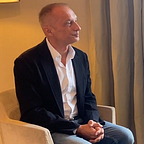We have all learned a great deal about ourselves, our businesses and our societies over the course of the pandemic. But perhaps one of the most interesting lessons has been that technology has enabled the markets to take it all in its stride.
The financial markets have changed immeasurably over the last thirty years. Once upon a time, the markets in Frankfurt, Hong Kong, London, New York, Singapore and Toronto were awash with professional traders hunched around electronic trading platforms, barking buy and sell orders down wired telephones. Highly skilled and handsomely rewarded when things went right, traders were a pivotal feature of the financial markets for the eighties and nineties.
By the turn of the century the improving technology saw sometimes inspired risk-taking start to be replaced by the consistency of computer algorithms, which could take data from a vast array of sources, convert into something that could be traded against, place trades significantly faster than the blink of an eye and, importantly, not offend anyone in a way that required someone from human resources to come down and have a word. The returns might not have been as stellar, but they were significantly more consistent.
In the subsequent years, algorithms have become more and more efficient and trading desks, which once dominated multiple floors in smart, gleaming glass and steel city offices, have shrunk to a fraction of their former size. The bright young things that populated the trading floors have gone on to join software houses designing business platforms, or retired to the suburbs with a multi-screen set-up in the spare room, where they supplement their retirement funds by day trading on their book.
Businesses rising, reaching their pomp, then becoming automated is a normal, healthy part of the evolution of the markets and business generally.
He challenge comes when something out of the ordinary happens. Since early 2020 when the practical ramifications of the Covid-19 pandemic started to become clear, financial markets of all sizes and hues have had to deal with a series of out of the ordinary incidents, and even eighteen months later, with vaccine programmes gathering pace across the world, we are still unclear about when, or even if, we are going to get back to normal.
Which could create challenges for the way that some parts of the financial markets have come to operate. At first glance it is more difficult for an algorithm to react in unusual circumstances than it would be for an experienced trader.
And yet… look a little more deeply and it could be that the algorithms are the reason that the markets have taken the challenges of the last eighteen months in their stride in the main. The only sector that has witnessed sudden and significant swings is crypto, which has developed a reputation for being very highly strung during its short existence. Markets have reacted and there have been some significant movements, but the evening news has not discussed market panic in the way you might have expected if a similar global challenge had arisen twenty years ago.
In many ways, the debate around whether traders were better than algorithms reflects the debate around self-driving cars. For most people, having a car that can drive itself is a great idea for a mundane commute when the roads are running well and there’s nothing out of the ordinary happening. The problem comes when the roads stop running well and something out of the ordinary happens. At that point, the instinct would be that it is important to have a human somewhere in the machine to make final decisions based on experience and a better understanding of nuance. The reality appears to be that the way the markets have come to operate have taken the challenges of the last eighteen months in their stride.
Warren Buffett once said that it’s only when the tide goes out that you can tell who is swimming naked. Perhaps that should be changed to it’s only when the tide goes out you can tell who is swimming pixilated.
Maybe the algorithm deserves a bonus.
About the author
Kay Rieck has been active on the investment side of the oil and gas sector for more than two decades. Starting his career as a financial adviser and stockbroker on the New York Stock Exchange, he quickly developed an interest in natural resources and associated assets, building his expertise with investment banking and asset management roles at the New York Board of Trade and the Chicago Board of Trade. Utilising his exceptional network of global contacts, he started his first exploration and production company in the US in 2008, selecting investments across the Haynesville Shale, Permian basin, Eagle Ford shale, Dimmit county and elsewhere that offered exceptional prospective returns.
